Years ago, on an old blog, I wrote a post for International Women’s Day about the female figures—real and fictional—who shaped me: the Spice Girls, Buffy Summers, and others who made me feel strong and seen. But as I was planning to write something similar last March, I realised the woman who truly made me who I am today was right there all along: my mum.
As Mother's Day approaches, I wanted to write something just for her, my ultimate hero.
But before I do, I want to gently acknowledge that this day isn’t easy for everyone. Whether you're celebrating, grieving, remembering, or simply getting through the day, I hope this post offers a moment of care and something that feels like love ♡
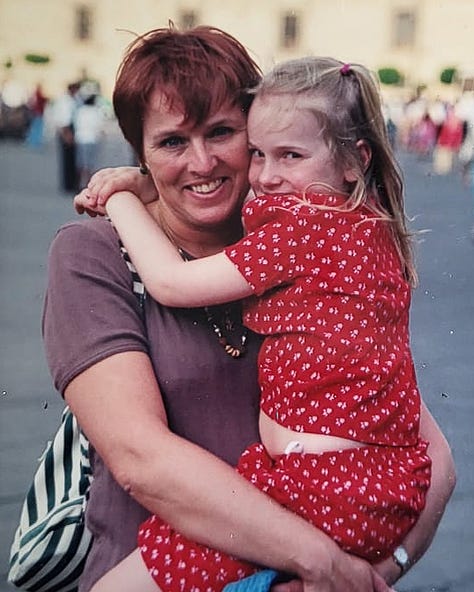
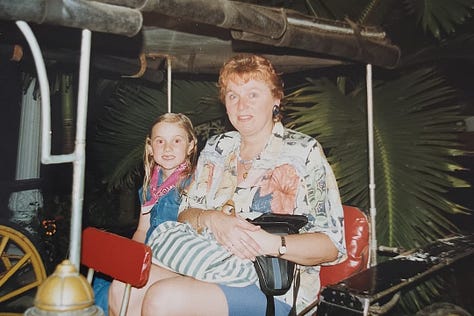
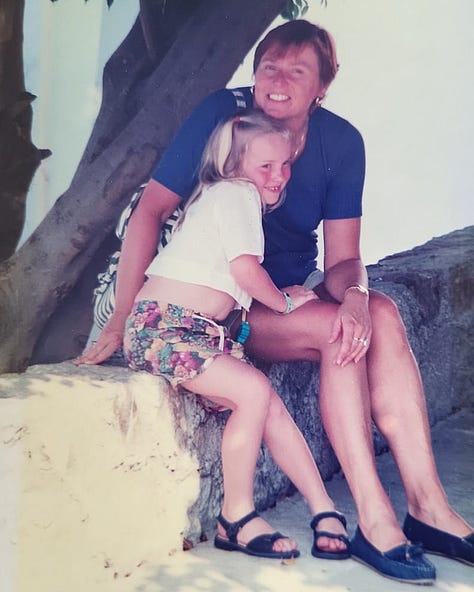
My mum has always had my back. See exhibit A, where she’s carrying me while on holiday in Mexico. See exhibit C, which shows us together on the same trip. If you take a closer look, you’ll see that I have a green Polly Pocket necklace hanging around my neck. One of my baby teeth was moving, on the brink of falling out before our holiday. She made sure to bring a little gift for me—a token from the Tooth Fairy. What happened wasn’t quite as smooth-sailing as it might seem. I lost my tooth on a hike, and then everyone in the group, including the guide, had to stop what they were doing and hunt for it in the grass. I mean, if I didn’t put my tooth under my pillow, the Tooth Fairy would never come and collect it. I was heartbroken. Spoiler alert: we found it, all muddy, so Mum cleaned it, and the Tooth Fairy knew nothing of it all. I was impressed she came all the way to Mexico just for it. What a greedy little beast!
When my parents divorced, I was nine. My sister (who is 12 years older) and I moved into a new flat with my mum, while my father moved to another city. Even the way I speak of them reflects who’s my favourite: my mum, but my father. She took care of everything—emotionally, financially, practically—on her own. Our flat had two bedrooms and a tiny den without windows. My mum took the den so my sister and I could each have a room of our own. Thinking about it, we were probably tight on money, but I never felt we lacked anything.
We weren’t frivolous—my mum got that from her own mother, my Bomma, who lived through World War II and taught her how to be smart with money. But that frugality also means she rarely treats herself, even now that she could. She’s been working since she was 15, is retired now, and more than deserves softness, comfort, and joy—and yet, when thinking about buying something for herself, she rarely indulges. But when I’m in town, she splurges on restaurants, cafés, and whatever else I might want or need.
When I’m sick, she’s just a phone call away with grandma-approved remedies. She fills the fridge with pescatarian options when I visit Belgium. She makes me laugh with her teenager-like behaviour. She is always snapping pictures of her plate, when I already have a bite in my mouth. She taught me not to take life too seriously. She also passed on a bit of her people-pleasing, but we’re working on it.
When I was a kid, she told me, “Quand on veut, on peut” (Where there is a will, there’s a way). At the time, I’d roll my eyes, but now I hear that line echoing whenever I push through something hard.
She had me in her late thirties, and despite the generational gap, she’s never stopped being open—learning, unlearning, questioning her own assumptions, sometimes surprising herself. She listens. She adapts. Even now, she’s in her early seventies and still curious enough to try a chai latte (she loved it), though matcha was a firm no.
Mums are the real GOATs. If I can be even a quarter of the woman she is when I’m 70, I’ll count that as a life well lived.
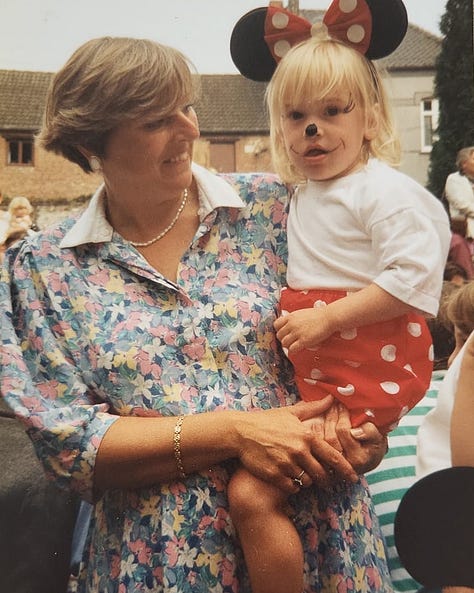
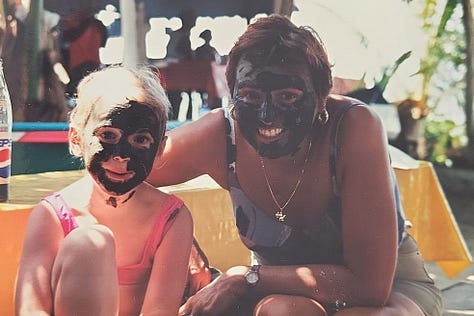
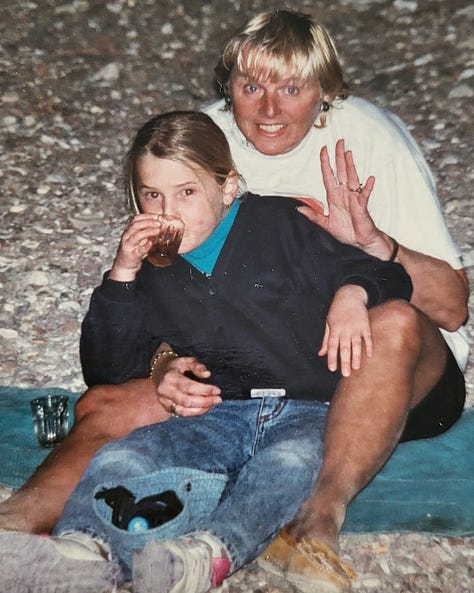
the pull of mother-daughter narratives
Maybe because of the bond I have with my mum, I’m endlessly drawn to stories that explore mother-daughter dynamics, especially books. To be honest, I’m a sucker for anything that touches on family: sisterhood (perhaps because I have a sister), siblinghood, motherhood (even though I don’t want children myself), family sagas, generational stories. If it’s familial, moving and captivating, I’m in.
Books that explore mother-daughter relationships form a rich and emotionally resonant subgenre that cuts across fiction and nonfiction. These stories often serve as intimate studies of identity, generational tension, love, resentment, care, and silence—frequently framed through gender, culture, class, and memory.
Here are some of the themes I see recurring in these books—and why I think they move us so deeply:
Ambivalence & Complexity
These relationships are rarely portrayed as straightforwardly loving or entirely fractured—they're layered with contradictions: closeness and distance, resentment and longing, tenderness and frustration.
Inheritance
Many books explore what is passed down, not just biologically, but emotionally and culturally. This might include trauma, silence, beliefs, and ways of being in the world.
Voice & Perspective
Often told from the daughter’s point of view, these narratives examine how women come into their own identities both in relation to, and in reaction to, their mothers.
Cultural & Generational Conflict
In diasporic or immigrant narratives, the mother-daughter dynamic is also a vessel for cultural translation, miscommunication, and assimilation.
Motherhood as Concept
In more philosophical or experimental works, the focus might be less on a literal relationship and more on the idea of motherhood—its expectations, costs, and desires.
Why do these stories resonate? Because a mother is often a woman’s first mirror. The relationship can feel inescapable, formative, and fraught. Whether the mother is absent, overbearing, emotionally distant, or a best friend, daughters often measure themselves against that presence or void. Books in this subgenre hold space for that reckoning—sometimes quiet and slow, sometimes fierce and chaotic.
a few standouts from my shelf
I wanted to share with you some of my favourite reads exploring mother–daughter (or parent–child) relationships in nuanced, affecting ways.
FICTION
Cold Enough for Snow – Jessica Au (2022)
A quiet, meditative novel in which a daughter takes her mother on a trip to Japan, reflecting on memory, distance, and the cultural threads that bind and estrange them.
Elena Knows – Claudia Piñeiro (2007)
(English translation by Frances Riddle published in 2021)
After the death of her daughter, an ageing woman with Parkinson’s disease defies her limitations to seek out the truth, confronting grief, motherhood, and autonomy.
Bad Fruit – Ella King (2022)
A tense and psychological portrayal of a British-Singaporean woman grappling with her emotionally manipulative mother and the intergenerational trauma she’s inherited.
Concerning My Daughter – Kim Hye-jin (2017)
(English translation by Jamie Chang published in 2022)
A conservative Korean mother struggles to accept her daughter’s queerness, questioning the boundaries of love, duty, and societal expectation.
Pachinko – Min Jin Lee (2017)
A sweeping multi-generational epic tracing a Korean family in Japan, where maternal resilience, sacrifice, and silent strength echo through each generation.
The Lamb - Lucy Rose (2024)
A taut, dreamlike novella about a mother and daughter’s retreat to a remote house, where love, control, and dependency simmer beneath the surface—and human meat is, quite literally, thrown in the pot.
On Earth We’re Briefly Gorgeous – Ocean Vuong (2019)
Written as a letter from a son to his illiterate mother, this lyrical novel (part memoir, part fiction) explores trauma, queerness, and the ineffable love between a mother and child across language and silence.
(More of a mother-son story, but I had to mention it.)
NONFICTION
Crying in H Mart – Michelle Zauner (2021)
A searing memoir about losing a mother, reckoning with identity, and finding solace in food, memory, and Korean culture.
I’m Glad My Mom Died - Jennette Mccurdy (2022)
A darkly funny and gut-wrenching memoir of childhood fame, abuse, and the long road to reclaiming identity beyond a controlling mother’s shadow.
still on my tbr
It’s exciting to know that this theme is quite popular and has been explored by many authors, because this means I have plenty more stories to discover. And I’d love to hear from you! Do you also find yourself drawn to these kinds of dynamics? Are there any books on mothers or daughters—or anything else that feels close to this—that you’d recommend? Leave them in the comments, I’d love to add to my list.
Here are some books I have my eye on:
FICTION
The Joy Luck Club – Amy Tan (1989)
Interwoven stories of Chinese-American mothers and daughters exploring heritage, identity, and generational disconnect.
The Mothers – Brit Bennett (2016)
A sharp, emotionally layered debut about a young woman navigating loss, secrets, and community, all under the watchful gaze of "the Mothers" in a Black church community.
My Name Is Lucy Barton – Elizabeth Strout (2016)
A subtle, pared-back novel about a woman reconnecting with her estranged mother from a hospital bed.
Hot Milk – Deborah Levy (2016)
A surreal and sensory novel following a daughter as she accompanies her mysteriously ill mother to a Spanish clinic, seeking both a cure and liberation.
The Tea Girl of Hummingbird Lane – Lisa See (2017)
A moving story about a Chinese mother and the daughter she gives up for adoption, exploring tradition, tea farming, and the unbreakable bond between them across continents and decades.
The Lost Daughter – Elena Ferrante (2006)
(English translation by Ann Goldstein published in 2008)
A slim, psychologically charged novel about maternal ambivalence, as a woman reflects on her past while observing a young mother and daughter at the beach.
Oranges Are Not the Only Fruit – Jeanette Winterson (1985)
A semi-autobiographical coming-of-age novel about a girl growing up in a strict religious household, grappling with her sexuality, her fiercely devout mother, and her desire for a life beyond dogma.
NONFICTION
Letter to My Daughter – Maya Angelou (2008)
Dedicated to the daughter she never had but sees all around her, Letter to My Daughter is a poetic and wise collection of essays written with daughterly intimacy. The stories transcend genre—part guidebook, part memoir, part poetry, pure delight.
A Woman’s Story – Annie Ernaux (1987)
(English translation by Tanya Leslie published in 1990)
In this sparse, unsentimental memoir, Ernaux reflects on the life and death of her mother, tracing the gap between generations, language, and class with aching clarity.
Blue Nights – Joan Didion (2011)
A luminous and heart-wrenching meditation on motherhood, memory, and ageing, written in the aftermath of Didion's daughter’s death, filled with elegiac reflections on love and letting go.
A final little note for this Sunday: whether this day brings joy, nostalgia, sadness, or something in between, I’m sending you love. Some of us are lucky to have our mums still with us. Some of us aren’t. Some of us have complex relationships, and some feel their absence more than their presence.
Whatever this day holds for you, I hope you can honour it in a way that feels right. Even if all it means is a quiet moment to remember or reflect. And if nothing else, I hope this post gave you a moment of connection.
Happy Mother’s Day—to the mums, the daughters, the grandmothers, the chosen mothers, and anyone navigating it all with a full heart 💐
Until next time,
Amandine
—
☕ if you'd like to support my writing, you can do so here—thank you! xx


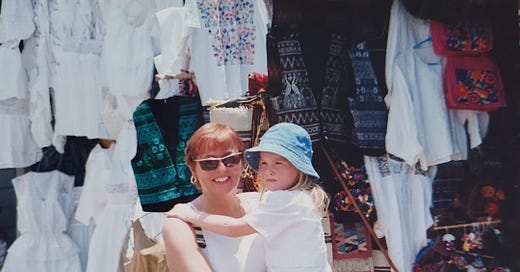


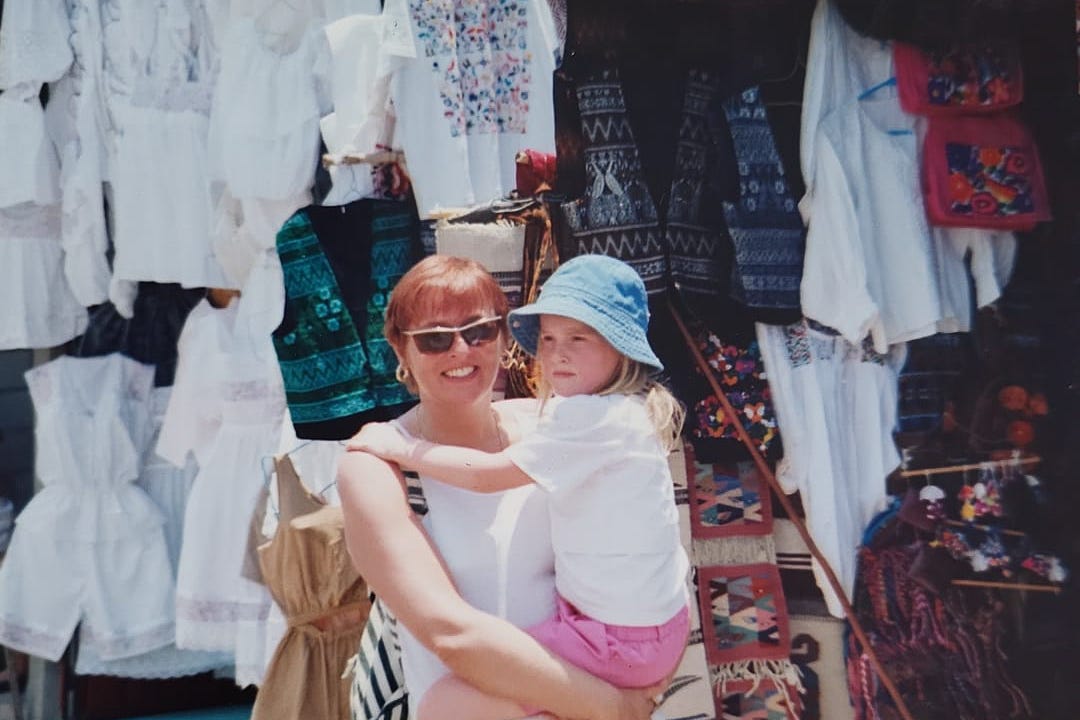
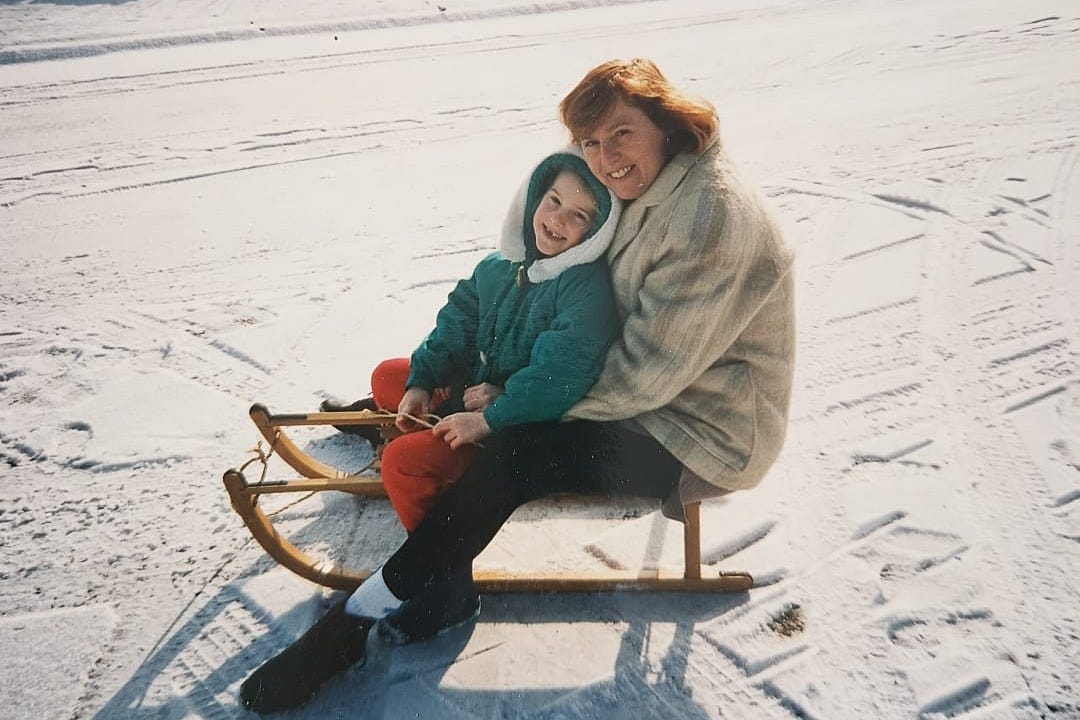

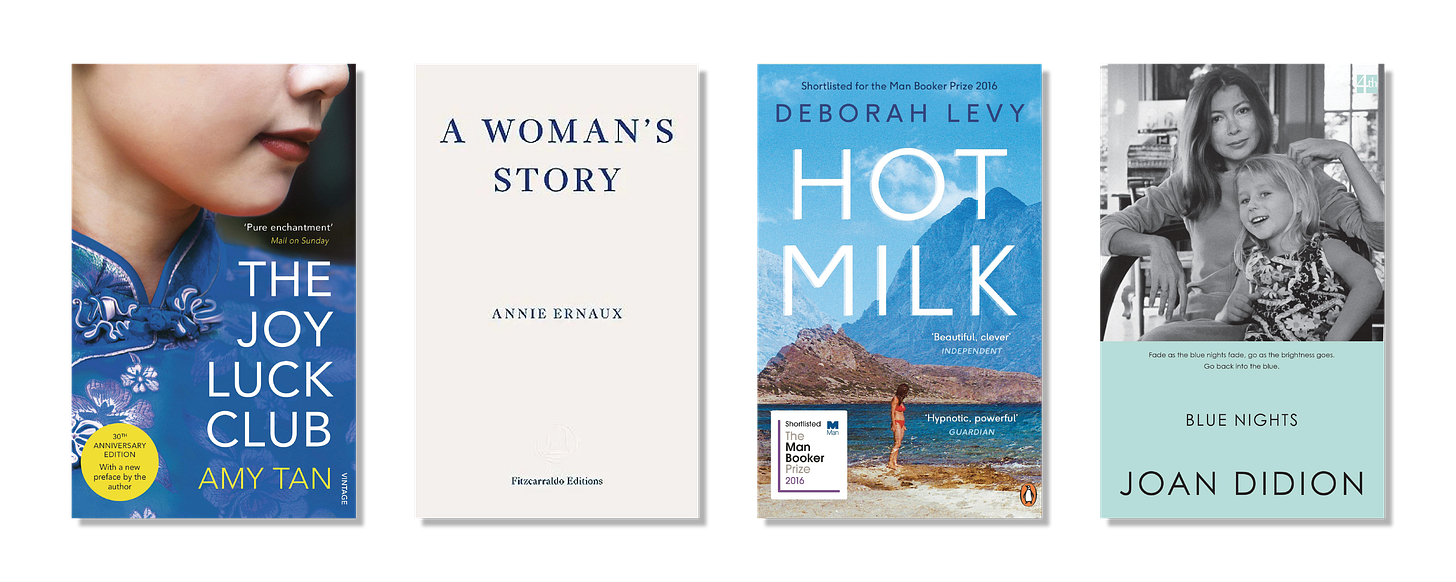
What a warm and heartfelt piece of writing <3
Totally related to this beautiful post. I was also raised by a single mom, so a lot of what you shared hit home. And I’m definitely adding all your book recs to my list thank you for sharing 🤍